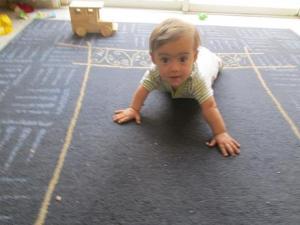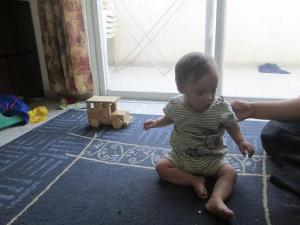Today I began reading a book that I’m really enjoying – ‘Get Off Your “But”: How to end self-sabotage and stand up for yourself’. The author is Sean Stephenson, born with a rare bone disorder. When he was born, most of his bones were broken because his bones were so brittle they couldn’t withstand the stresses of being born. It’s hard for me to even comprehend that – his parents weren’t allowed to hold him because the force of that could break more bones. Can you imagine? This disorder led to many, many broken bones over the years – he said he and his parents stopped counting at 200 – things that we could do without thinking would break his bones. It also affected his growth and ability to walk – his adult height is 3 feet and he is in a wheelchair, since his bones aren’t able to support him standing up and walking.
In this book he shares about a difficult situation he experienced at the age of 10, and when he was screaming in pain and asking his mother why he had to go through all of this suffering, her response was very striking. So much so that I copied it down for myself and want to share it with you as well since it really resonated with me. What she told him was, “Pain is inevitable. Eventually, it touches us all. Suffering, however, is optional.”
This encapsulated my thoughts on the subject of living through difficult times in such a pithy way! It also clarified a point that I’ve been trying to keep clear for myself, that of acknowledging one’s pain to oneself, not denying it but also not getting lost in it. It’s very easy to turn off and pretend that everything is fine. I was talking to a friend about this topic and she said she had recently read a book about codependence, and it said that’s what codependents do. It’s also very easy to talk a good game and say how everything is fine.
But in my opinion, it’s much harder to feel your pain and at the same time, make the choice that you’re not going to wallow in it or allow it to run your life. Feeling your pain is, well, painful! And we try to avoid experiencing unpleasant feelings. But it’s really important to be able to touch the vulnerable and tender parts of ourselves. This past week I’ve been consciously working on giving my kids space to feel their sadness, not rushing to reassure them when they express some distress. Here’s the example that made me realize I needed to be more in touch with this. Last week my ds14 was supposed to pick up ds5 from kindergarten, and forgot. When he realized this, he felt really badly and said, “Oh my gosh, I forget everything!”
Now, this son has been an unbelievable help in the last month. He’s taken over all the laundry, he and dd16 cleaned the house for Pesach together and kept everything running throughout me being gone at hospitals and then being sick; he’s changed his morning schedule so that he can take ds5 to school every day, and he helps out in many other ways. I responded, “You’ve been an amazing help in this last month and I really appreciate all that you’ve been doing. We all forget things sometimes, it’s okay.” I actually thought that was a good response; I didn’t express annoyance or frustration that he forgot something important. But when I shared this with an advisor, she pointed out to me that I wasn’t giving him a space to be sad. This was extremely astute of her to pick up on. What I should have said was, “I see you feel really badly about forgetting to pick up ds – that must be a horrible feeling.” And let him say what he wanted to say before going on with what I said, rather than smoothing things over without acknowledging his sadness about not doing something that he should have.
When this situation was pointed out to me I realized that I do this pretty often, thinking that I’m being encouraging or supportive. So that’s something I’ve been working on this week. I don’t want my kids to have to pretend that everything is okay when it’s not, and I don’t want to cut off their opportunities to express their negative feelings even though I’ve been doing it with the best of intentions.
It might sound a little strange to say that it’s a positive feeling to feel the sadness of things not being the way you want, but it’s been a good growing experience. As small as these little changes were that I made when listening to the kids, I realized tonight that it had a positive impact on me in deepening my ability to be in touch with my own feelings. That was a pretty nice side benefit!
So back to the quote. Yes, we all will go through tough things in life. And it will be painful. But that doesn’t mean we have to be miserable about it. I met someone at the supermarket before Pesach who was picking up a huge order of meat, and I asked her why she was buying so much. She told me she would be cooking for thirty people every day of Pesach. I commented that it sounded hard, and she said to me, “It’s not easy but it’s sameach – happy. And when you’re happy, then nothing is too much.” I agreed with her, with the caveat that I shared above – that a person be honest with themselves and not just put on a superficial mask of happiness.
Today someone told me that I’m a strong person. People often tell me that, but I’m not so sure. Maybe, maybe not. But what I did tell her is that I really believe that everything that happens is for the good, even when I don’t see it, and that helps me deal with a lot of what happens in my life. So much of our suffering is in our mind, in the thoughts we think about what we go through. I try to be aware of my thinking, since our thoughts determine our emotions, but recently I felt so snowballed that I got off keel and was thinking in a negative and besieged way. I caught myself doing this so now I’m working on being conscious of my thoughts and actively replacing negative thinking with thoughts that are more productive. This is where I think the idea that suffering is optional comes in. We can’t control what happens to us, but we can choose our response.
Avivah


